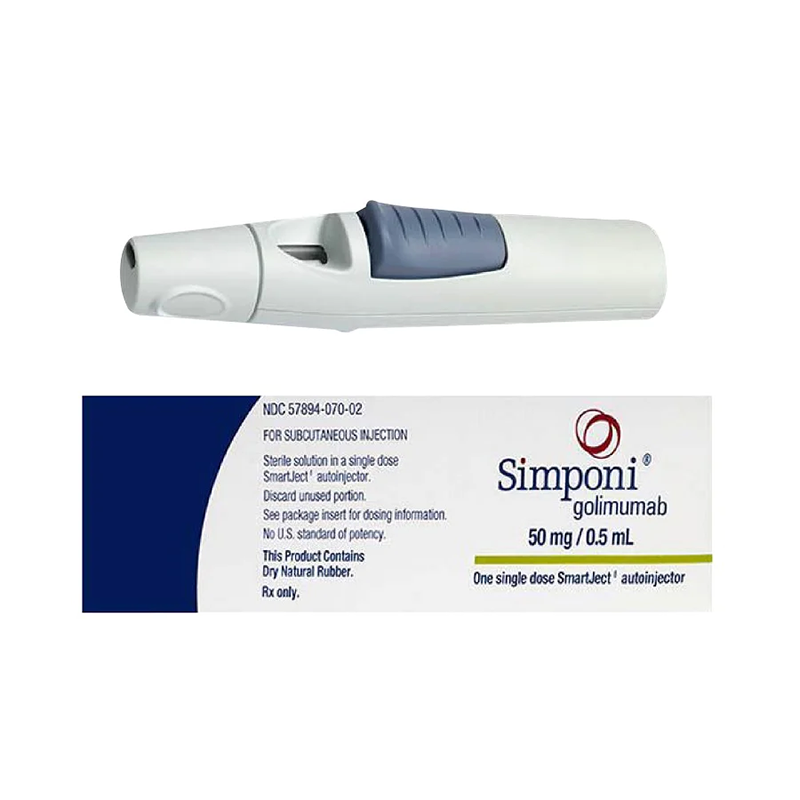JANSSEN
SIMPONI (Golimumab)
SIMPONI (Golimumab)


Couldn't load pickup availability
What is this medication?
SIMPONI/SIMPONI ARIA (Golimumab)
Antipsoriatic Agent; Antirheumatic, Disease Modifying; Monoclonal Antibody; Tumor Necrosis Factor (TNF) Blocking Agent
SIMPONI (Golimumab) is a human IgG1қ monoclonal antibody that prevents the binding of tumor necrosis factor (TNF) to its receptors. Golimumab is indicated for the treatment of rheumatoid arthritis, psoriatic arthritis, ankylosing spondylitis, and ulcerative colitis.
How does this medication work?
SIMPONI (Golimumab) is a human monoclonal antibody that forms high affinity, stable complexes with both the soluble and transmembrane bioactive forms of human TNFα, which prevents the binding of TNFα to its receptors thereby inhibiting the biological activity of TNFα (a cytokine protein). The exact mechanism by which golimumab treats ulcerative colitis is unknown.
How should I take this medication?
SIMPONI
SQ: Inject 50mg subcutaneously once monthly.
Note: Ulcerative Colitis 200mg initial subcutaneous injection at Week 0, followed by 100mg at Week 2 and then 50mg every 4 weeks thereafter.
SIMPONI ARIA
IV: Inject 2mg/kg over 30 minutes by intravenous infusion at weeks 0 and 4, and every 8 weeks thereafter.
What should I watch for while using this medication?
Before starting SIMPONI (Golimumab) make sure your physician is aware of any allergies or medications you currently take. Golimumab has been associated with several serious adverse effects including infections and malignancy. Serious infections leading to hospitalization or death, including sepsis, tuberculosis (TB), invasive fungal, and other opportunistic infections have been observed with the use of TNF antagonists including golimumab. Administration of golimumab should be discontinued if a patient develops a serious infection or sepsis. Treatment should not be initiated in patients with active infections including chronic or localized infections. Tuberculosis may be due to reactivation of latent tuberculosis infection or to new infection. Before starting treatment with golimumab, all patients should be evaluated for both active and latent tuberculosis. Lymphoma and other malignancies, some fatal, have been reported in patients treated with TNF blockers, such as Golimumab.
What is the difference between a prefilled syringe and an autoinjector?
Both an autoinjector device and prefilled syringe are comparable with respect to ease of use, tolerability, and efficacy. However the addition of an autoinjector to deliver a prefilled syringe can enhance patient safety.
What if I miss a dose?
Patients who miss a dose, should be advised to inject this missed dose as soon as they become aware of it, and then follow with their next scheduled dose.
How should I store this medication?
Store refrigerated at 2ºC to 8ºC (36ºF to 46ºF). Keep the product in the original carton until time of use to protect from light. Do not freeze. Do not shake. Keep out of the sight and reach of children. Once the SIMPONI ARIA solution has been diluted, it should be stored at room temperature, protected from light and the infusion should be completed within 6 hours of preparation.
What are the possible side effects of using this medication?
Upper respiratory tract infection, alanine aminotransferase increased, viral infection, aspartate aminotransferase increased, neutrophil count decreased, bronchitis, hypertension, and rash.
Note this is not a complete list of side effects for SIMPONI (Golimumab), only common ones.


